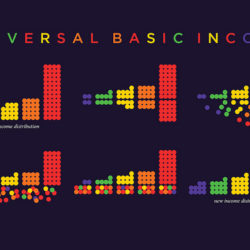
3 Reasons Why You Shouldn’t Fear UBI

Universal Basic Income is (becoming) a hot topic and major institutions are seriously exploring its potential. This is important, as the increasing automatization of jobs means the work world will look very different in the future. Although many top economists have stressed the positive impact it would have on society and our economy, misconceptions mean many people see UBI as a ridiculous and unfeasible pipe dream. This week I will be looking at three of the major arguments against UBI and showing why they should not dissuade us from exploring this initiative.
UBI Fear #1: “It’ll be too expensive!”
Yes, there is a definite cost involved in introducing UBI. The important thing to remember, however, is said cost will be returned to the local economy, helping it to grow and remain healthy. UBI has also been shown to improve overall health rates, and this in turn could lower our healthcare costs. Also, considering we (via the government) are already subsiding major corporations, investing in ourselves should not be such a negative concept. UBI has the potential to improve the lives of millions of people and that is worth the investment.
UBI Fear #2: “UBI would lead to inflation, rendering the benefits moot!”
As long as the system is set up properly, this will not happen. In a government-funded system, the adoption of a basic income initiative does not mean that governments will instantly start printing vast amounts of extra money to meet demands, thus causing massive inflation. Instead, the money used to fund the system is money that is currently part of the economy, just requisitioned from other areas. Also, the base money given by UBI is not so generous that it will drastically change people’s spending habits, it’s just that a percentage of the purchasing money is (potentially) coming from a different source. Supply and demand will remain relatively constant, limiting the risk of inflation.
UBI Fear #3: “People will just stop working and do nothing all day!”
Previous basic income experiments have disproved this logic. In fact, basic income increases entrepreneurship and can actually improve employment rates. When Namibia introduced UBI unemployment rates decreased from 60% to 45% and a UBI pilot project in India saw increased employment and entrepreneurship rates. Think of it this way: Giving people a solid financial base reduces stress and anxiety and improves overall emotional and health rates, making them better employees. Plus, UBI can offer people the opportunity to pursue further education, making them more skilled workers. As well, UBI will compensate the many people doing unpaid labour like childcare, senior care and housework. The workplace of tomorrow will not suffer from the introduction of UBI. Instead, it will undergo a needed renovation and emerge healthier than ever.
A socially-conscious society should be doing what it can to ensure the health and well-being of its people and a universal basic income is the best way to do just this. By giving people a solid financial base we can reduce poverty and improve the health and well-being of the general population. Technologically-speaking we are at the point where we need to remake the work world, as technological innovation has changed how we create and manage so many things, and UBI will help us survive and thrive as we adapt to the next stage of employment. For the good of humanity, it’s time we introduced a basic income.

